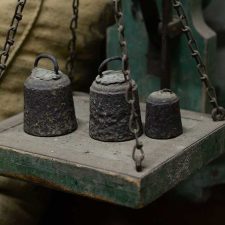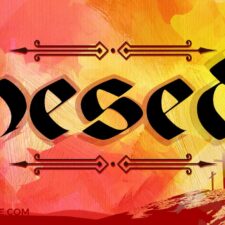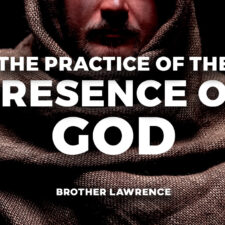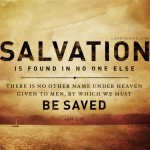The story of the Bible is the history of God leading His people through the wilderness. The clearest illustration of this is found in the books of Moses and the records of the Hebrew nation and their road to the promised land. It proved to God’s people He would be their leader in the wilderness through Moses, as Psalm 77:20 says, “You led Your people like a flock by the hand of Moses and Aaron.”
Once God brought His people through the Red Sea and guided them to Mount Sinai, He defined for them a new relationship with Him through the Torah, His laws. Paul tells us in Galatians 3:23-24 that “we were kept in custody under the law,” the law becoming a tutor (one who leads children) to lead us to Christ. God’s plan was that He would be with them, His presence going before them as a pillar of cloud by day and fire by night. His presence would reside in the middle of all religious activities as the Ark of the Covenant to remind them of His holiness. Ultimately, the Father was guiding His people through the wilderness to find His Son. He was teaching them how to be led and how to follow.
While the Tabernacle and all its elements were being constructed, Moses would move his tent outside the camp as the tent of meeting where Moses would meet with God, evidenced by the pillar of cloud (Exodus 33:7-9). The people would spend more than a year in this place, getting oriented to this new way of experiencing God. Moses asked God not to lead them anywhere unless His presence went with them (verse 15). God acknowledged that He would honor Moses’ request in verse 17: “The Lord said to Moses, ‘I will also do this thing of which you have spoken; for you have found favor in My sight and I have known you by name.’”
Then in Numbers 10:11-12, the cloud left Sinai “in the second year, in the second month,” heading to Kadesh-barnea (interpreted as “a holy place in the desert”). It turned out to be a regular stopping point as the people wandered in the wilderness before entering the promised land. It also was from this place that Moses would send spies into the promised land in Numbers 13. God wanted them to immediately “go in and possess the land which the Lord swore to give to your fathers” and their descendants (Deuteronomy 1:8).
But that’s not what happened.
Two Conclusions
God instructed Moses to choose twelve men who would sneak into the promised land to “See what the land is like, and whether the people who live in it are strong or weak, whether they are few or many” (Numbers 13:18). In verses 27-29, ten of them reported that the land was truly fruitful, but the people living in the land were too strong for them to overcome. These ten spoke for the masses. The other two had a different take. They told Moses, “We should, by all means, go up and take possession of it, for we will surely overcome it” (Verse 30). These two recognized that the people were not limited by their own ability and that the Lord would be the difference. Caleb and Joshua’s testimonies were not enough to sway the people, and the nation ended up wandering in the wilderness for another 38 years.
What caused this difference in conclusions? It had to do with the relationship that each had with God. It is one thing to follow, and it is another thing to trust in the leader. In Numbers 14:24, “But My servant Caleb, because he has had a different spirit and has followed Me fully, I will bring into the land which he entered, and his descendants shall take possession of it.” God was promising Caleb that he and his descendants would enjoy the fruit of the promised land, unlike those who could not trust Him. In addition, God chose Joshua to succeed Moses in leading the people into the new land because he was “a man in whom is the Spirit” (Numbers 27:18), one who could be trusted because he was a man being led by the Holy Spirit. According to Joshua 14:8, he says, “I followed the Lord my God fully.”
Following the Leader
2 And Moses summoned all Israel and said to them, “You have seen all that the Lord did before your eyes in the land of Egypt to Pharaoh and all his servants and all his land; 3 the great trials which your eyes have seen, those great signs and wonders. 4 Yet to this day, the Lord has not given you a heart to know, nor eyes to see, nor ears to hear. 5 I have led you forty years in the wilderness; your clothes have not worn out on you, and your sandal has not worn out on your foot. 6 You have not eaten bread, nor have you drunk wine or strong drink, in order that you might know that I am the Lord your God. 7 When you reached this place, Sihon, the king of Heshbon and Og the king of Bashan came out to meet us for battle, but we defeated them; 8 and we took their land and gave it as an inheritance to the Reubenites, the Gadites, and the half-tribe of the Manassites. 9 So keep the words of this covenant to do them, that you may prosper in all that you do.” (Deuteronomy 29:2-9)
In the process of finding an individual and personal conviction to follow God, the believer finds others who appear to follow the Lord and gets behind them. This is the process of following those placed in one’s life as an example since they have proven themselves by their consistent walk. In Philippians 3:17, Paul writes, “Brethren, join in following my example, and observe those who walk according to the pattern you have in us.” Moses was that example for the Hebrews in the wilderness while they learned to trust in the Lord’s provisions. All the provisions necessary for fullness in the believer’s life are realized in the process of following. In Verse 6, “You have not eaten bread, nor have you drunk wine or strong drink, in order that you might know that I am the Lord your God.” Even victories over enemies are found there. It is God’s way of demonstrating that this quality of life is possible and real.
The Spirit of Christ
If we are to fully follow God, we must believe on and trust in the One whom we follow. Jesus left us with the Holy Spirit, the Spirit of Truth, Who will guide us into all the truth. The Spirit is also referred to as the Spirit of Christ in Romans 8:9 and 1 Peter 1:11. Without faith, it is impossible to please God. Without faith in Who Jesus is, we become no more than people wandering in the wilderness, just like the nation of Israel. Moses was a great man of faith, and Hebrews 11:27 tells us, “By faith he left Egypt, not fearing the wrath of the king; for he endured, as seeing Him who is unseen.” Moses saw Jesus as he was being led!
14 “For all who are being led by the Spirit of God, these are sons of God. 15 For you have not received a spirit of slavery leading to fear again, but you have received a spirit of adoption as sons by which we cry out, ‘Abba! Father!’ 16 The Spirit Himself testifies with our spirit that we are children of God.” (Romans 8:14-16)
The leading of the Holy Spirit produces maturity, sons rather than just children. This happens when we see our heavenly Father as “Abba,” Daddy, and then our relationship with Him becomes personal and not abstract. It produces an assurance, a confidence that we truly are His children, part of His royal family. We are then able to trust Him no matter where He leads us.













